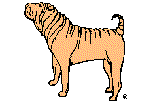


The Chinese Shar-Pei, an ancient and unique breed, is thought to have originated in the area around the small village of Tai Li in Kwantung province, and has existed for centuries in the southern provinces of China, apparently since the Han dynasty (c.200 B.C.). Statues bearing a strong resemblance to the Shar-Pei have been discovered and dated to this period. More recently, a Chinese manuscrpt of the 13th century has been translated; it refers to a wrinkled dog with characterisitics much like those of the Shar-Pei.
The name "Shar-Pei" itself literally means "sand-skin", but translates more loosely as "rough, sandy coat" or "sand-paper-like coat" and refers to two distinctive qualities of the Shar-Pei coat--roughness and shortness--which make the breed unique in the dog world. The Shar-Pei shares another distinctive characteristic with only one other breed, the Chow-Chow, in having a blue-black tongue, which may indicate an ancestor common to both breeds. However, proof of such a relationship is difficult.
The history of the Chinese Shar-Pei in modern times is incomplete. However, it is known that, following the establishment of the People's Republic of China as a communist nation, the dog population of China was essentially eliminated. No dogs were seen in the cities, and few dogs remained in the countryside. During this period a few Chinese Shar-Pei were bred in Hong Kong, BCC, and in the Republic of China (Taiwan).
The breed was recognized and registered by the Hong Knog Kennel Club until about 1968. Subsequently the Hong Kong and Kowloon Kennel Association established a dog registry and registered the Shar-Pei. This organization still registers the breed today as do other registries in Taiwan, Japan, and Korea, as well as organizations in Canada, Great Britian and some European countries.
In the United States, the documented history of the breed goes back to 1966 when a few dogs were imported from stock registered with the Hong Kong Kennel CLub. The American Dog Breeders Association registered a Chinese Shar-Pei for J. C. Smith on October 8, 1970. Strong interest in the breed increased in 1973 when Matgo Law of Down-Homes Kennels, Hong Kong, appealed to dog fanciers in the United States to "Save the Chinese Shar-Pei". The response was enthusiastic, and because of their rarity, a limited number of Shar-Pei arrived in the United States in the fall of 1973. The recipients of these dogs corresponded with each other and decided to form a national dog club and registry. The Chinese Shar-Pei Club of America, Inc., held its first organizational meeting in 1974, and the club has been in continuous existence since that time. The first annual National Specialty Show was held in 1978 and successive national shows have been held each year.
The Club's primary purpose was to promote the breed, to maintain a stud book registry, and to provide a standard of the breed. On May 4, 1988, the Chinese Shar-Pei was accepted into the American Kennel Club (AKC) Miscellaneous Class. The CSPCA continued to represent the breed and operate the registry until the AKC accepted the breed in to the Non-Sporting Group on August 1, 1992. The CSPCA continues to promote the best interests of the breed, maintains the Standard, and serves as a Member Club of the AKC.
 CSPCA Membership Application
CSPCA Membership Application Get your own Free Home Page
Get your own Free Home Page